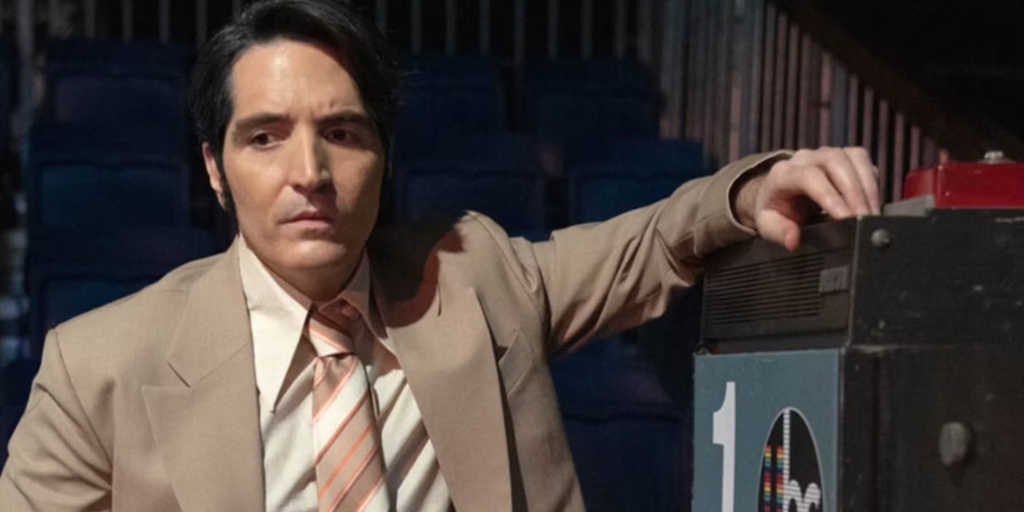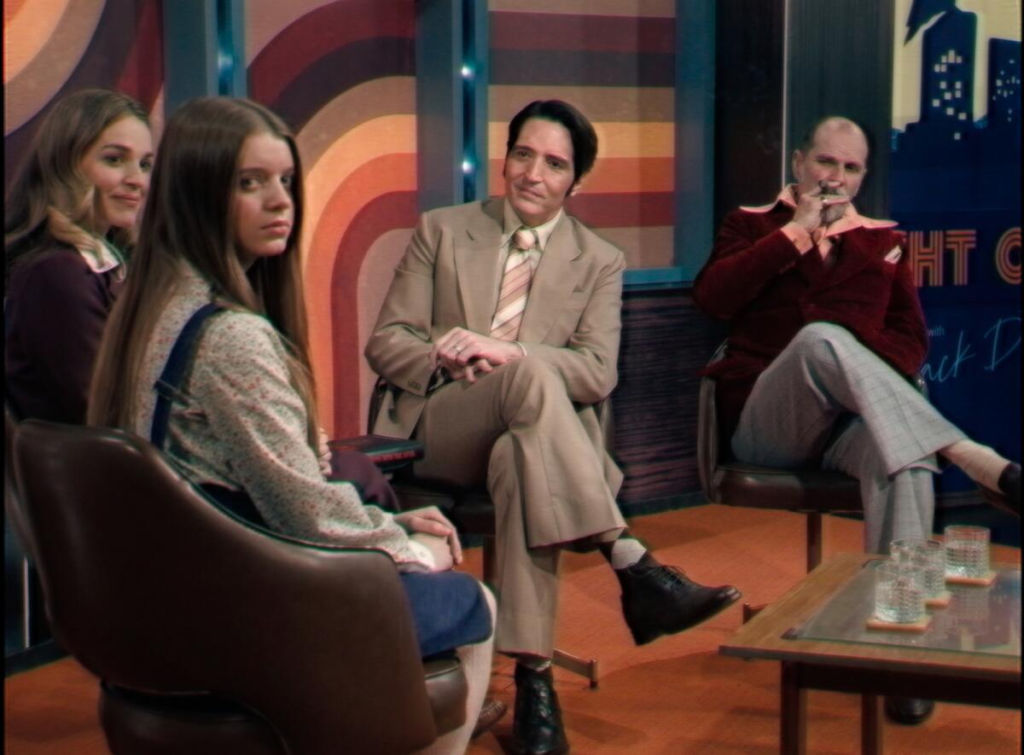Directors: Cameron Cairnes, Colin Cairnes
Writers: Colin Cairnes, Cameron Cairnes
Stars: David Dastmalchian, Laura Gordan, Ian Bliss
Synopsis: A live television broadcast in 1977 goes horribly wrong, unleashing evil into the nation’s living rooms.
Playing out like a weeknight exposé television special, Late Night with the Devil is an homage to many things. Horror is right up there at the top of course, but this film from Colin and Cameron Cairnes is as in love with late night television as it is with genre films. More specifically, it’s clear the Cairnes have a passion for the late 70s styles of both of these mediums. If the sizzle reel that opens the film giving a brief rundown of the 70s wasn’t evidence enough, the majority of the film is also shot in this very style. By practically transporting the viewer to a specific time and place, it allows for the experience to feel less like watching a film, and more like reliving or experiencing a moment in time. This particular moment? A late night television slot that goes horribly wrong, but not in the way some might think.
Yes, this is a straight up horror film. But even though we’re well aware of this going in, how the Cairnes take us there might throw some for a loop. Late Night with the Devil requires the same patience as many 70s horror films that came before it. Not only that, much of this film does play out in the style of found footage. The viewer is forced to operate on the idea that the tapes of this episode of “Night Owls with Jack Delroy” are real. And, as written earlier, the Cairnes were committed to convincing their audience that it is genuine. Through the same cameras, lighting, and flashy television sets of the time, “Night Owls” is fully believable to have been a late night show that time forgot. One of the more frustrating elements of the film, now becoming a point of contention online, is in the sparse instances where this commitment seems to have fallen to the wayside. A handful of interstitials that last mere seconds in the film were generated by artificial intelligence. For a film that’s so steeped in the look and feel of a specific period in time, it’s confounding that such a throwaway piece of art wouldn’t be designed by an actual artist. While it may not be painfully obvious to some when watching, it should nevertheless be called out as a simple question as to why that decision was made for something so trivial, but full of exciting potential. But beyond mere production value, this film simply doesn’t work without the host. It takes a lot to keep viewers coming back daily to watch your show at midnight, but Jack Delroy is able to make it happen. And when you see David Dastmalchian on that stage, reading jokes straight out of a writers room in a well put-together suit, it all makes sense.

At this point, Dastmalchian is an actor that most will recognize. Having worked with both Christopher Nolan and Denis Villeneuve several times will do that. But he’s often been on the fringes of those films. Perhaps the most he’s been given to do was from James Gunn in The Suicide Squad, playing Polka Dot Man. What many thought was a ridiculous inclusion prior to the release of that film proved to be an excellent choice. Performed with layers of unsettling demeanor, bone-dry comedy, and a genuine pathos, Dastmalchian’s character is one of the most memorable elements of the film. And now, he has ascended from character actor (which I adore him as, and hope he continues to devour wonderful roles) into a leading man, with a film that feels perfectly designed for him. Jack Delroy might appear happy-go-lucky on viewers’ television sets, but there’s clearly something haunted about him. Perhaps it’s what kept his viewers tuning in, checking to see if that episode would be the one that caused him to snap. And the episode the film follows, a spooky Halloween episode, turns out to be just that very thing.
It’s only right that such an homage to the 70s era of horror leans into the patience of those films. By no means do I want to imply this is a film that could be considered boring, nor do I mean to imply that the era of filmmaking it pulls from is too slow-paced. It’s my belief that greater patience rewards a wonderful pay off, and the Cairnes certainly deliver in that regard. Over the course of 90 minutes, this “episode of television” plays out in a way that you could imagine its actual audience both mystified and engaged. Or it could just be something they change the channel from immediately. Yes, the events occurring on screen are compelling to us through the context of the film. But in the eyes of a 1970s television viewer, this might be just another typical occult hoax being capitalized on. That the Cairnes are able to balance both past and present values and interests with such ease speaks to the simple, yet effective writing. And then it all culminates, in classic fashion, with a thrilling sequence full of squirm-inducing practical effects and mean-spiritedness.

One of the more exciting elements of the subtext, or even the apparent text, of Late Night with the Devil, is its examination of the medium of television as a whole. The film opens (with Michael Ironside narration!) by diving into the outlook on televisions in the late 70s. Obviously children everywhere wanted a television set, but there was a hesitancy to have the youth be “brainwashed” by all that would be shown. Yes, television was an escape. But it also served as a near constant reminder of the political and social turmoil going on just outside your doors on a nightly basis. The 24-hour-news cycle was just on the cusp of being introduced to the world, but it would have likely felt similar to turning on the television now and only ever hearing the worst news imaginable. The Cairnes allow the similarities between the past and present to continue on, as well, in the ways in which the pressures of fame distort even the best of us. It becomes increasingly clear that the lust for fame and popularity has always been ingrained in us as people. You may begin to realize that there’s nothing particularly exciting about Jack Delroy as a person. In fact, he’s played by Dastmalchian as just some guy on television. We’re only truly invested because he’s the lead of the film. Whether it’s a likely forgettable late-night television show from 1978, or a streamer on Twitch in 2024, the fact remains the same: people want to be seen. So the question remains: to what lengths will you go to get those eyes on you? Late Night with the Devil lures its viewers in with just that enticing question, before showing the innate, and even occult, dangers in such a situation.





